情态动词和虚拟语气
中的情态动词和虚拟语气有哪些

中的情态动词和虚拟语气有哪些情态动词(Modal Verbs)是一类特殊的动词,在英语中常用来表达情态、态度、意愿、推测、能力、建议等含义,通常用来修饰其他动词。
而虚拟语气(Subjunctive Mood)是一种用来表示假设、愿望、建议、命令等非现实情况的语气。
情态动词一共有十个,它们分别是can、could、may、might、shall、should、will、would、must、ought to。
这些情态动词在语言表达中起到了很重要的作用,下面将对它们的具体用法进行介绍。
1. Can和CouldCan表示一种能力、可能性或许可性,用于表达某人能够完成某事。
Could表示过去或将来某个时间点的能力或可能性。
例如:- He can speak three languages fluently.(他能够流利地说三种语言。
)- Could you pass me the salt, please?(你能递给我盐吗?)2. May和MightMay表示许可、可能性或祝愿,用于表示允许某事发生或对现实情况的推测。
Might在语气上更加委婉,表达对现实情况的推测,表示较小的可能性。
例如:- May I borrow your pen?(我可以借用一下你的笔吗?)- I may/might go to the party tonight.(我可能今晚去参加派对。
)3. Shall和ShouldShall用于征询意见或提供建议,主要用于第一人称以及第三人称的单数和复数。
Should表示某事做起来更好,用于提出建议、义务或期望。
例如:- Shall we go out for dinner tonight?(我们今晚出去吃饭吧?)- You should take a break and relax.(你应该休息一下,放松一下。
)4. Will和WouldWill表示意愿、决心或预测,表示对未来的确定或实际情况。
虚拟语气和情态动词的高级应用和考点进阶
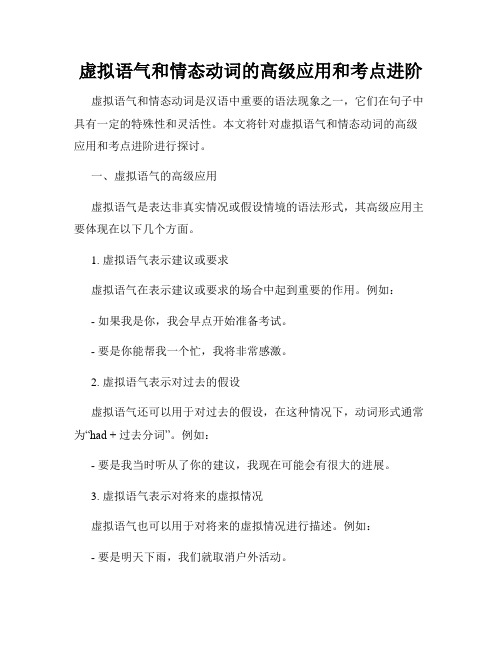
虚拟语气和情态动词的高级应用和考点进阶虚拟语气和情态动词是汉语中重要的语法现象之一,它们在句子中具有一定的特殊性和灵活性。
本文将针对虚拟语气和情态动词的高级应用和考点进阶进行探讨。
一、虚拟语气的高级应用虚拟语气是表达非真实情况或假设情境的语法形式,其高级应用主要体现在以下几个方面。
1. 虚拟语气表示建议或要求虚拟语气在表示建议或要求的场合中起到重要的作用。
例如:- 如果我是你,我会早点开始准备考试。
- 要是你能帮我一个忙,我将非常感激。
2. 虚拟语气表示对过去的假设虚拟语气还可以用于对过去的假设,在这种情况下,动词形式通常为“had + 过去分词”。
例如:- 要是我当时听从了你的建议,我现在可能会有很大的进展。
3. 虚拟语气表示对将来的虚拟情况虚拟语气也可以用于对将来的虚拟情况进行描述。
例如:- 要是明天下雨,我们就取消户外活动。
二、情态动词的高级应用情态动词可以用于表示说话人的态度、意愿以及对可能性和推测的判断。
以下是情态动词的高级应用。
1. 情态动词表示推测和可能性情态动词用于表示推测和可能性时,可以强调说话者的判断。
例如:- 他一定在家,因为他的车停在门口。
2. 情态动词表示许可和禁止情态动词还可以用于表示许可和禁止的意思。
例如:- 你可以用我的电脑。
- 禁止吸烟。
3. 情态动词表示建议和义务情态动词也可以表示建议和义务。
例如:- 你应该多锻炼身体。
- 你必须完成这个任务。
三、虚拟语气和情态动词的考点进阶除了虚拟语气和情态动词的基本应用外,还存在一些考点和进阶的用法。
1. 虚拟语气和情态动词的混合使用在某些情况下,虚拟语气和情态动词可以同时出现在一个句子中,用以表达更加灵活的语义。
例如:- 如果他今天来,我们会很高兴。
2. 虚拟语气和情态动词在条件从句中的应用在条件从句中,虚拟语气和情态动词的使用经常需要特别注意。
例如:- 如果我有时间,我愿意帮你。
3. 虚拟语气和情态动词在陈述句中的用法除了在虚拟条件句中使用外,虚拟语气和情态动词还可以在陈述句中使用,用以表示说话人的态度或意愿。
虚拟语气与情态动词的区别及用法解析

虚拟语气与情态动词的区别及用法解析虚拟语气和情态动词是语法中两个不同的概念,但在一些语法规则和用法上有一些相似之处。
虚拟语气是一种用来表示假设、愿望、建议、要求等非现实情况的语气,它并不是真实存在的,而是对虚构的事件或状态进行描述。
而情态动词则是一类用于表示说话人的态度、推测、能力、许可等情态意义的动词。
一、虚拟语气的用法1. 假设虚拟语气经常用于表示虚拟的假设情况,即与事实相反或不可能实现的情况。
常见的虚拟语气形式包括“如果…(过去式)”,“要是…(过去式)”等。
例如:- If I were a bird, I would fly freely in the sky.如果我是一只鸟,我就可以在天空中自由飞翔。
2. 愿望虚拟语气还可以用于表示愿望,即对现实情况的一种虚构或想象。
常见的虚拟语气形式包括“希望…(过去式)”,“但愿…(过去式)”等。
例如:- I wish I had studied harder last night.我希望昨晚学习更努力一些。
3. 建议、要求虚拟语气还可以用于表示建议、要求等情况。
常见的虚拟语气形式包括“(要求、建议)+过去式”。
例如:- The doctor suggested that I take some rest.医生建议我休息一下。
二、情态动词的用法1. 表示能力、推测情态动词可以用来表示说话人的能力或对某种情况的判断。
常见的情态动词有can、could、may、might等。
例如:- She can swim very well.她游泳技术非常好。
2. 表示许可、允许情态动词还可以表示许可或允许的意思。
常见的情态动词有can、may等。
例如:- Can I borrow your pen?我能借用你的笔吗?3. 表示义务、应该情态动词也可以表示说话人对某种行为或义务的责任或要求。
常见的情态动词有should、ought to等。
例如:- You should apologize to him for your mistake.你应该为你的错误向他道歉。
语法中的虚拟语气与情态动词的结合

语法中的虚拟语气与情态动词的结合虚拟语气是语法中一个重要的概念,它用来表达非真实的情况、假设、愿望或建议。
虚拟语气的使用涉及到情态动词,这是语法中另一个重要的部分。
情态动词用来表示说话人的态度、情感、能力等。
一、虚拟语气的概念和用法虚拟语气是用来表达非真实情况的一种语法形式。
它可以表示假设、愿望、推测、建议等。
虚拟语气通常与“if”引导的条件句、动词的过去式以及情态动词一起使用。
1. 条件句中的虚拟语气在条件句中,如果主句表达的是虚拟的情况,从句使用虚拟语气,即使用“were”代替“was”,无论主语是单数还是复数。
例如:If I were a bird, I would fly in the sky.(如果我是一只鸟,我会在天空中飞翔。
)2. 愿望中的虚拟语气在表达愿望时,常使用虚拟语气。
例如:I wish I could go on a vacation.(我希望我能去度假。
)这里的“could”就是虚拟语气。
3. 推测中的虚拟语气在表示对现在或过去情况的推测时,也需要使用虚拟语气。
例如:He acts as if he were the boss.(他表现得像是老板。
)这里的“were”代替了“was”,表示推测的情况。
二、情态动词的作用和用法情态动词是一类特殊的动词,用来表示说话人的态度、情感、能力等。
常见的情态动词包括can、could、may、might、shall、should、will、would、must等。
1. 表示能力和许可情态动词可以用来表示能力和许可。
例如:I can swim.(我会游泳。
)这里的“can”表示能力。
You may go now.(你现在可以走了。
)这里的“may”表示许可。
2. 表示推测和猜测情态动词也可以用来表示推测和猜测。
例如:He must be tired.(他一定很累。
)这里的“must”表示推测。
3. 表示义务和建议情态动词还可以用来表示义务和建议。
情态动词与虚拟语气(详解版)(新版)
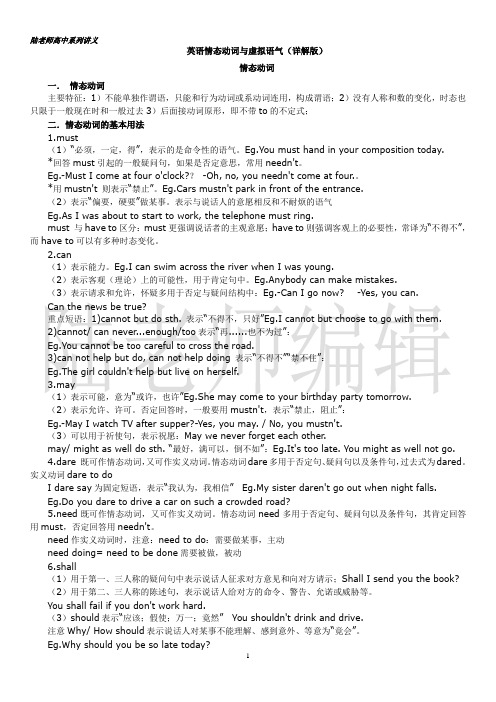
英语情态动词与虚拟语气(详解版)情态动词一.情态动词主要特征:1)不能单独作谓语,只能和行为动词或系动词连用,构成谓语;2)没有人称和数的变化,时态也只限于一般现在时和一般过去3)后面接动词原形,即不带to的不定式;二.情态动词的基本用法1.must(1)“必须,一定,得”,表示的是命令性的语气。
Eg.You must hand in your composition today.*回答must引起的一般疑问句,如果是否定意思,常用needn't。
Eg.-Must I come at four o'clock??-Oh, no, you needn't come at four.。
*用mustn't 则表示“禁止”。
Eg.Cars mustn't park in front of the entrance.(2)表示“偏要,硬要”做某事。
表示与说话人的意愿相反和不耐烦的语气Eg.As I was about to start to work, the telephone must ring.must 与have to区分:must更强调说话者的主观意愿;have to则强调客观上的必要性,常译为“不得不”,而have to可以有多种时态变化。
2.can(1)表示能力。
Eg.I can swim across the river when I was young.(2)表示客观(理论)上的可能性,用于肯定句中。
Eg.Anybody can make mistakes.(3)表示请求和允许,怀疑多用于否定与疑问结构中:Eg.-Can I go now? -Yes, you can.Can the news be true?重点短语:1)cannot but do sth. 表示“不得不,只好”Eg.I cannot but choose to go with them.2)cannot/ can never...enough/too表示“再......也不为过”:Eg.You cannot be too careful to cross the road.3)can not help but do, can not help doing 表示“不得不”“禁不住”:Eg.The girl couldn't help but live on herself.3.may(1)表示可能,意为“或许,也许”Eg.She may come to your birthday party tomorrow.(2)表示允许、许可。
虚拟语气与情态动词

虚拟语气与情态动词虚拟语气表示说话人的愿望、假设、猜测或建议,而不表示客观存在的事实。
虚拟语气通过谓语动词的特殊形式来表示,下面对虚拟语气在各种句式中的用法分别介绍。
虚拟语气用于条件状语从句。
表示与现在事实相反的假设时,条件状语从句中的谓语动词用“过去式(be的过去式用were)”,而主句中的谓语动词用“would(should, could, might)+动词原形。
”例如:If I were you, I should studay English.If he had time, he would attend the meeting.表示与过去的事实相反的假设时,条件状语从句的谓语动词用“had +过去分词”,主句中的谓语动词用“would(should, could, might)+have +过去分词”。
例如:If you had taken my advice, you wouldn’t have failed in the examination.表示与将来事实相反的假设时,条件从句和主句所用的谓语动词怀“表示与现在事实相反的假设”的谓语动词相同,或者条件从句中用“were to(should)+动词原形”。
例如:If you come tomorrow, we would have the meeting.If it were to rain tomorrow, the meeting would be put off.当条件状语从句表示的行为和主句表示的行为所发生的时间不一致时,动词的形式要根据它所表示的时间来调整。
例如:If you had worked hard, you would be very tired.(从句说的是过去,主句指的是现在.)5.以上句型可以转换成下列形式:1)省略if,用“were, have, should +主语”. 例如:Were I in school again, I would work harder.Had you been here earlier, you would have seen him.Should there be a meeting tomorrow, I would come.但在虚拟条件状语从句中,省略连词的倒装形式的句首不能用动词的缩略形式,如我们可以说:Were it not for the expense, I would go to Italy.但不能说Weren’t it for the expense, I would go to Italy.2)用介词短语代替条件状语从句.例如:Without air, there would be on living things.But for your help, I couldn’t have done it.3)用其了方式表示.例如:It would produce had results to do that.= If you have done that, it would produce bad results.(二)虚拟语气用于宾语从句“wish +宾语从句”表示不能实现的愿望,汉语可译为“可惜……”. “……就好了”, “悔不该……”, “但愿……”等.表示现在不能实现的愿望,从句的谓语动词用过去式;表示将来不能实现的愿望用“would(could) +动词原形”;表示过去不能实现的愿望时用“had +过去分词”或“(could)would +have +过去分词”.例如:I wish it were spring all the year round.I wish you could go with us.We wish we had arrived there two hours earlier.虚拟语气在动词arrange, command, demand, desire, insist, order, propose, request, require, suggest,等后面的宾主从句中用“(should)+动词原形”.例如:We suggested that we (should) have a meeting.We insisted that they (should) go with us.The doctor ordered that she (should) stay in bed for a few days.He demanded that we (should) start right away.注意:insist作“力言”, “强调”解时,宾语从句不用虚拟语气,只有当insist作“坚持(认为)”, “坚持(应该)”解时宾语从句才用虚拟语气.例如:Mike insisted that he had never stolen anything.(三)虚拟语气用于表语从句、同位语从句作advice, idea, order, demand, plan, proposal, suggestion, request等名词的表语从句和同位语从句,其谓语动词要用虚拟语气的结构“(should)+动词原形”.例如:We all agreed to his suggestion that we (should) go to Beijing forsightseeing.My idea is that we (should) exercises first.(四)虚拟语气在as if(as though),even if( even though)等引导的表语从句或状语从句中的应用.如果从句表示的动作发生在过去,用过去完成时,指现在状况,则用过去时,指将来则用过去将来时.例如:He looked as if he were an artist.He speaks English so fluently as if he had studied English in England.Even if he were here,he could not solve the problem.(五)虚拟语气用于主语从句.在主语从句中,谓语动词的虚拟语气结构用“should 十动词原形”的结构,表示惊奇、不相信、惋惜、理应如此等.例如:It is necessary( important,natural,strange,etc) that …we should cleanthe room every day.It was a pity ( a shame,no wonder,etc) that you should be so careless.It will be desired( suggested,decided,ordered,requested,proposed,etc)that she should finish her homework this afternoon.在上述三种主语从句中,should意为“应该”,“竟然”,可以省去,但不可换用would.主句所用动词的时态不限.注意:这种从句表示的是事实.如果说话人对这种事实表现出惊奇的情感,就可用虚拟语气.反之,如果不表示惊奇等情感.That从句也可用陈述语气,例如:It is a strange that he did not come yesterday.It is a pity that you can’t swim.(六)虚拟语气用于定语从句这种从句常用在It is( high) time( that)…句型中,定语从句的谓语动词用过去式,或should十动词原形( should不能省略,be用were)来表示,意为“(现在)该……”。
语法中的情态动词与虚拟语气的用法

语法中的情态动词与虚拟语气的用法在语法中,情态动词和虚拟语气都是重要的概念。
它们在句子中起到不同的作用,用法也各有特点。
本文将详细介绍情态动词和虚拟语气的用法,并指导读者如何正确运用它们。
一、情态动词的用法情态动词是英语中的一类特殊动词,包括can、could、may、might、shall、should、will、would、must等。
它们通常用来表达说话人的意愿、能力、推测、建议等。
1. 表示能力与可能性情态动词can和could常用来表示能力和可能性。
例如:"She can swim."(她会游泳。
)"I could understand the movie."(我能理解电影。
)在这些句子中,can和could表达了能力与可能性的概念。
2. 表示推测与可能性情态动词may和might用于表示可能性和推测。
例如:"It may rain tomorrow."(明天可能会下雨。
)"She might be late for the meeting."(她可能会迟到会议。
)在这些句子中,may和might表达了对未来事件的推测。
3. 表示义务与建议情态动词should常用于表示义务和建议。
例如:"You should take a break."(你应该休息一下。
)"We should recycle to protect theenvironment."(我们应该回收以保护环境。
)在这些句子中,should表达了建议和应该做的事情。
4. 表示意愿与请求情态动词will和would通常用于表示意愿和请求。
例如:"I will help you with your homework."(我会帮你做作业。
)"Would you please pass me the salt?"(请你递给我盐吗?)在这些句子中,will和would 表达了说话人的意愿和请求。
语法篇专题情态动词和虚拟语气

用法
例句
can和could
表示能力
He can speak English better than you.
表示请求 或允诺?
You can have the book when I have finished it. Could you come again tomorrow?
表示客观可能性
should have done
过去本来应该……,而实际上没有……
The plant is dead. Maybe I should have given it more water.
ought to have done
过去本该……,而未……
You ought to have given him more help.
专题八 情态动词和虚拟语气
情态动词
一、情态动词 定义:情态动词是一种本身具有一定词义,但要与动词原形及其被动语态一起使用的词。它给谓语动词增添情态色彩,表示说话人对有关行为或事物的态度和看法,认为其可能、应该或必要等。 二、情态动词的特点 情态动词无人称和数的变化, 情态动词后面跟的动词需用原形,否定式构成是在情态动词后面加“not”。 个别情态动词有现在式和过去式两种形式, 过去式用来表达更加客气, 委婉的语气, 时态性不强, 可用于过去,现在或将来。情态动词属于非及物动词,故没有被动语态。
三、情态动词的语法特征 (1) 情态动词不能表示正在发生或已经发生的事情,只表示期待或估计某事的发生。 (2) 情态动词除ought 和have 外,后面只能接不带to 的不定式。 (3) 情态动词没有人称和数的变化,即其第三人称单数不加s。 (4) 情态动词没有非限定形式,即没有不定式,分词形式,也没有相应的动名词。 四、情态动词的基本用法
情态动词与虚拟语气
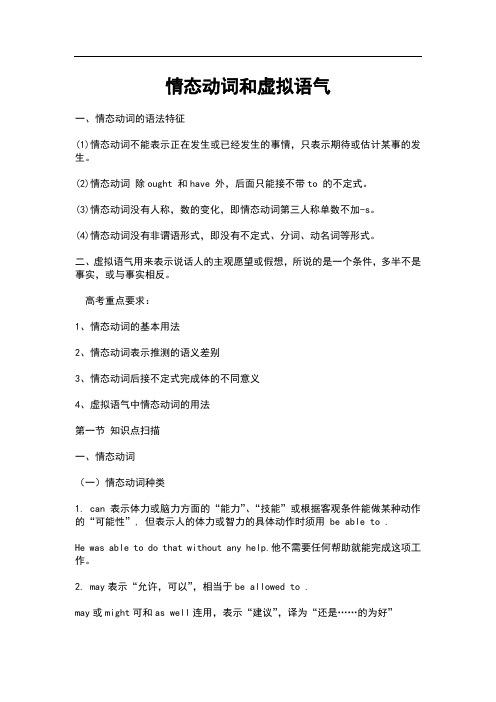
情态动词和虚拟语气一、情态动词的语法特征(1)情态动词不能表示正在发生或已经发生的事情,只表示期待或估计某事的发生。
(2)情态动词除ought 和have 外,后面只能接不带to 的不定式。
(3)情态动词没有人称,数的变化,即情态动词第三人称单数不加-s。
(4)情态动词没有非谓语形式,即没有不定式、分词、动名词等形式。
二、虚拟语气用来表示说话人的主观愿望或假想,所说的是一个条件,多半不是事实,或与事实相反。
高考重点要求:1、情态动词的基本用法2、情态动词表示推测的语义差别3、情态动词后接不定式完成体的不同意义4、虚拟语气中情态动词的用法第一节知识点扫描一、情态动词(一)情态动词种类1. can表示体力或脑力方面的“能力”、“技能”或根据客观条件能做某种动作的“可能性”, 但表示人的体力或智力的具体动作时须用 be able to .He was able to do that without any help.他不需要任何帮助就能完成这项工作。
2. may表示“允许,可以”,相当于be allowed to .may或might可和as well连用,表示“建议”,译为“还是……的为好”You may as well keep a certain distance from that mad man. 你们还是离那疯子远点为好。
You might as well go home now.你还是现在回家为好。
3. must表示“必须”或“应当”、“一定”。
4. have to 加动词原形,表示“不得不”,“必须”,它比must更强调客观。
Tom had to work into the deep night every day to earn a living. 汤姆为了生计每天都得工作到深夜。
5. should 表示“劝告”,“建议”或“义务”时,译作“应当”,或表示“预测”和“可能”。
He should take care of his parents as they are old enough not to live on themselves. 由于父母亲老了,不能自理,他应当照顾他们。
情态动词和虚拟语气 高考英语 语法

a test on the subject next month.
—Don’t worry.You________have it by Friday. A.could C.must 解析: B.shall D.may 句意为:——我至今还没有拿到参考书,但是下个月这
个学科就要测试了。——别担心,周五之前你一定会有的。本题考查情
(2008· 北京卷)John promised his doctor he would not smoke,and he
never smoked ever since.
约翰答应医生不再吸烟了,并且从那时起他再也不吸烟了。 (2)will 可以表示一种习惯性的动作,有“总是”或“总要”之意。 Every morning he will have a walk along this river. 每天早晨,他总是沿着小河散步。 7.may 与might (1)“may as well+动词原形”意为“最好,满可以,倒不如”。
You may as well do it at once.你最好马上就做这件事。
We may as well stay where we are. 我们留在现在的地方倒也不错。
(2)may 作“可以”讲时,其否定式常用“mustn’t”表示“禁止”;
情态动词与虚拟语气

情态动词与虚拟语气情态动词是英语中一类特殊的动词,它们用于表达说话人的情态、态度、能力、推测和意愿等,如can、could、may、might、shall、should、will、would、must等。
而虚拟语气则是一种语法形式,用来表示非真实、假设、愿望、建议、命令等。
情态动词和虚拟语气常常结合使用,以表达一定的假设、愿望或建议等含义。
一、情态动词的用法1. 表示能力和许可:can、could、may、might情态动词can表示一种能力或技能,表示某人有能力完成某事。
例如:He can play the piano very well.(他弹钢琴弹得很好。
)情态动词could表示过去的能力或技能,常用于否定句或疑问句中。
例如:I couldn't find my keys this morning.(今天早上我找不到我的钥匙。
)情态动词may和might表示允许或许可的意思,也可以表示推测或猜测。
注意may是一种程度上更强的允许,而might则程度上会稍微弱一些。
例如:You may leave the party early if you want.(如果你愿意,你可以早点离开派对。
)I might go to the movies tonight.(今晚我可能去看电影。
)2. 表示推测和猜测:must、should、would情态动词must表示说话人确定的推测和猜测,表示事实的推测,带有较强的肯定意义。
例如:She must be tired after running a marathon.(她参加完马拉松赛后一定很累。
)情态动词should表示一种合理的推测和猜测,表示根据某种常理或按照经验而做出的推测。
例如:He should be at home now because he usually comes back at this time.(他应该在家,因为他通常在这个时间回来。
语法中的情态动词与虚拟语气的结合运用

语法中的情态动词与虚拟语气的结合运用在语法学中,情态动词是一类用于表示说话人态度、能力、推测等的动词,而虚拟语气则是用于表示假设、愿望、建议等非现实情况的语气。
在英语中,情态动词与虚拟语气有着紧密的结合,共同承担着表达特定语义的任务。
本文将探讨情态动词与虚拟语气的结合运用,并举例说明其在实际语言中的应用。
一、情态动词的基本特点情态动词是由实义动词在语法上的派生形式,具有一些共同的特点:1. 情态动词没有人称和数的变化,并且不加-s或-ed作为第三人称单数形式或过去式。
2. 情态动词后面必须跟动词原形,构成情态动词加动词原形的结构。
3. 情态动词在肯定句和否定句中有不同的用法,通常不能用于疑问句。
二、情态动词的基本意义不同的情态动词具有不同的意义,在句子中起到相应的语义作用。
下面是一些常见的情态动词及其基本意义:1. Can:能够、可以2. Could:过去能够、过去可以、曾经可能3. May:可能、也许、可以、祝愿4. Might:可能、也许5. Must:必须、一定、一定会、肯定6. Shall:将要、会、应该、是否7. Should:应该、将会8. Will:将要、会、愿意9. Would:将要、愿意、宁愿三、虚拟语气的基本形式虚拟语气用于表示非真实的情况,通常是用在条件句、愿望句、建议句、命令句等中。
以下是虚拟语气的基本形式:1. 虚拟条件句中,谓语动词用过去式,如果主句动词是be,那么用were代替was。
2. 在愿望句和建议句中,谓语动词用过去式。
3. 在命令句中,谓语动词用should加原形动词。
四、情态动词与虚拟语气的结合运用情态动词与虚拟语气的结合运用非常灵活,既能表示假设和虚构的情况,又能表达愿望、建议等态度。
下面是一些典型的例句,展示情态动词与虚拟语气的结合运用:1. If I were you, I would study harder.(如果我是你,我会更加努力学习。
)2. I wish I could speak fluent English.(但愿我能说一口流利的英语。
高中英语2025届高考语法复习情态动词与虚拟语气知识讲解
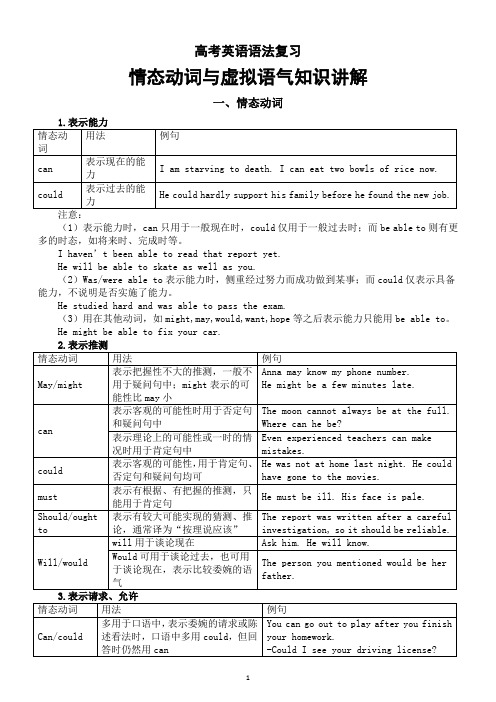
高考英语语法复习情态动词与虚拟语气知识讲解一、情态动词(1)表示能力时,can只用于一般现在时,could仅用于一般过去时;而be able to则有更多的时态,如将来时、完成时等。
I haven’t been able to read that report yet.He will be able to skate as well as you.(2)Was/were able to表示能力时,侧重经过努力而成功做到某事;而could仅表示具备能力,不说明是否实施了能力。
He studied hard and was able to pass the exam.(3)用在其他动词,如might,may,would,want,hope等之后表示能力只能用be able to。
He might be able to fix your car.(1)must还可以表示质问或感情色彩,意为“偏要,偏偏”。
Why must it snow on Saturday?(2)should还可以表示惊奇、愤怒、失望等特殊情感,尤其用在以why,who,how等开头的疑问句中或某些感叹句中。
why should you be so late today?(1)must作“必须”讲的一般疑问句,其肯定回答用must,否定回答用needn’t或don’t have to。
-Must I pay now?-Yes, you must./No, you needn’t.(2)need还可以作实义动词,有人称和数的变化,后跟带to的不定式作宾语。
She needed to go out for a walk.(1)两者在表示过去的习惯动作或行为时常可通用。
When we were children, we would/used to go skating every winter.(2)Used to与would都不能与表示具体频率、次数的词及特定的时间状语或具体的一段时间连用。
情态动词与虚拟语气

情态动词与虚拟语气(一) 情态动词的基本用法1. can be able to could①can 和 be able to 都表示能力,意思上没多大区别。
但 can 只有现在和过去时,而 be able to 则有更多的形式。
但当成功地完成某一具体动作时,通常不用 could 而用was/were able to 来表示。
这时 was/were able to 相当于 managed to或succeeded in ,表示经过一番努力,终于能够完成某事。
如:The wounded man still was able to get to the village and was saved in the end.②can 和 could: can 和 could 都可以表示能力、技能、许可、建议或请求和可能性。
但比较委婉客气地提出问题或陈述看法,一般用 could,回答时则用 can。
如: Could you help me carry the bag? Can I help you?2. may/might①may/might 表示可能,但 may 比 might 可能性大。
如:—Why isn't he in class? —He may be sick.(生病的可能性较大) He might be sick.(生病的可能性较小)②may/might 表示"允许",may 用于现在时或将来时,might 常用在间接引语中表过去时,但 might 也可用于现在时间,表示比较委婉的语气,回答用 may。
如: He says we may leave. He said we might leave.③may / might 表示建议或请求, might 比 may 更客气,但意思更肯定而无过去时态的含义。
如:---May / Might I use your bike?---Yes, you can / may/ No,you mustn’t3. must /have to①must 表示必须,应该,强调主观意愿,没有时态变化。
情态动词和虚拟语气
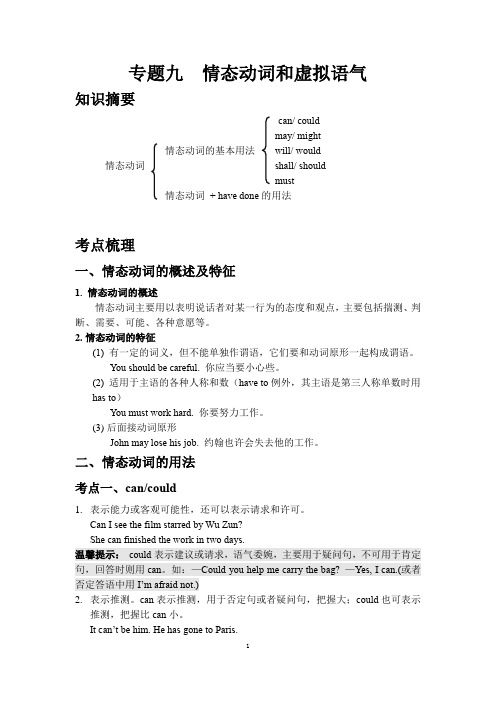
专题九情态动词和虚拟语气知识摘要can/ couldmay/ might情态动词的基本用法will/ would情态动词shall/ shouldmust情态动词+ have done的用法考点梳理一、情态动词的概述及特征1. 情态动词的概述情态动词主要用以表明说话者对某一行为的态度和观点,主要包括揣测、判断、需要、可能、各种意愿等。
2.情态动词的特征(1) 有一定的词义,但不能单独作谓语,它们要和动词原形一起构成谓语。
You should be careful. 你应当要小心些。
(2) 适用于主语的各种人称和数(have to例外,其主语是第三人称单数时用has to)You must work hard. 你要努力工作。
(3)后面接动词原形John may lose his job. 约翰也许会失去他的工作。
二、情态动词的用法考点一、can/could1.表示能力或客观可能性,还可以表示请求和许可。
Can I see the film starred by Wu Zun?She can finished the work in two days.温馨提示:could表示建议或请求,语气委婉,主要用于疑问句,不可用于肯定句,回答时则用can。
如:—Could you help me carry the bag? —Yes, I can.(或者否定答语中用I’m afraid not.)2.表示推测。
can表示推测,用于否定句或者疑问句,把握大;could也可表示推测,把握比can小。
It can’t be him. He has gone to Paris.Look! Someone is coming! Who can it be?3.用于陈述句中,表示理论上或者习惯上的可能性。
It can be quite cold here in winter.It could be very exciting to go out for a drive.【知识拓展】1. 辨析:can、be able to 和could(1)can只有现在和过去时,而be able to则有更多的时态变化。
情态动词与虚拟语气知识点

情态动词与虚拟语气一、情态动词1.Can/could①表示能力:能/可以/会(could为过去式)②表示请求:可以(一般用于疑问句,could表示更委婉)注:could提问时,回答不能用could例:Could I smoke here?Yes,you can/No,you can’t③表示推测:不可能can't/couldn't(只用在否定句)注:表示推测时也可以用在疑问句或肯定句,但是很少,常见的例句:Can/Could it be true?That can/could be......2.may/might①表示请求:可以(一般用于疑问句,might表示更委婉)注:May提问,否定回答mustn't/can't②表示推测:也许(might比may可能性小)3.Must①表示命令/警告:必须(否定为mustn't“禁止”)注:must提问,否定回答needn't/don't have to②表示推测:一定(否定为can't“不可能”)4.will/would①用于构成将来时②表示意愿:会5.Need①实义动词need to do/need doing②情态动词(一般只用在疑问句或否定句)6.had better最好(注意否定had better not)7.Dare 敢(习惯接不定式,不过to也可以省略)8.Should ①应该②竟然注:ought to=should 应该9.have to 不得不Have to表示客观影响,must强调主观意愿10.be able to=canbe able to有时态变化,可以与其他情态动词连用,can不可以;另外,be able to更强调历经磨难,通过努力得到成功二、情态动词+have done1.三个推测(对过去的推测)①must have done:一定做了...②may/might have done:也许做了...③can't have done:肯定没做...2.could have done:本来能够做...例:You could have made greater progress,but you didn't.3.should/ought to have done:本该做...(却没做)4.needn't have done:本不必做...(却做了)5.Would have done:本会做...(实际上没做到)三、虚拟语气1.if的非真实条件句中例:①If I were you,I would accept his advice②If it rained/should rain/were to rain tomorrow,I would stay at home③If you had studied hard before,you would have passed the exam△if从句中,were/had/should可以放在句首(部分倒装),此时if必须省略,且否定词not不能放在前面例:①If I hadn't seen him then,I wouldn't have been very happy→Had I not seen him then,I wouldn't have been very happy②If I were you,I would accept his advice→Were I you,I would accept his advice2.错综时间条件句谓语动词根据句子本身的时态自行变化例:If you had followed my advice just now,you would be better now3.含蓄虚拟语气在某些介词存在的句子中,如果出现非真实的情况,要使用虚拟语气,常见的介词有:with/without/but for/or/but/otherwise等规则:例:①I was ill that day,otherwise,I would have taken part in the meeting②Without electricity,human being life would be quite different today4.wish与if only例:①I wish he could visit us tomorrow②If only you had listened to our advice!5.would rather(宁愿)/would sooner(宁可)/would as soon(宁愿)例:①I’d rather you came here tomorrow②I’d rather you hadn't told me the truth6.as if/as though例:①He looks as if he were an artist②He talked about the accident as though he had seen it7.用于建议(advise/suggest/propose/recommend)、命令(order/command)、要求(demand/require/request/desire/ask)、坚持要求(insist)、催促(urge)的从句中。
情态动词和虚拟语气
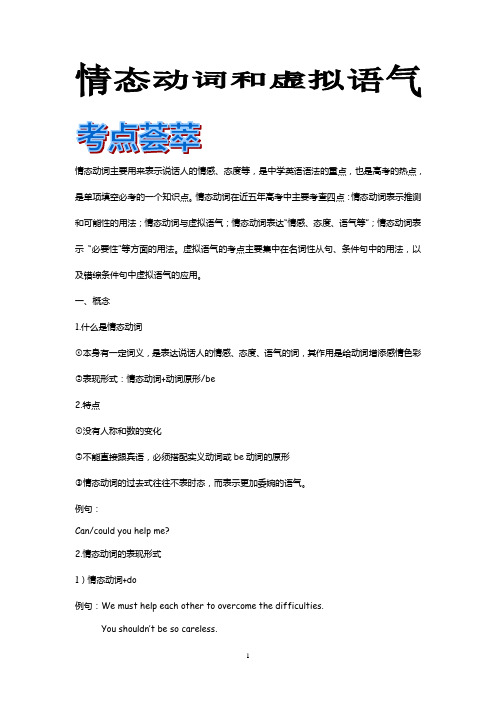
情态动词主要用来表示说话人的情感、态度等,是中学英语语法的重点,也是高考的热点,是单项填空必考的一个知识点。
情态动词在近五年高考中主要考查四点:情态动词表示推测和可能性的用法;情态动词与虚拟语气;情态动词表达“情感、态度、语气等”;情态动词表示“必要性”等方面的用法。
虚拟语气的考点主要集中在名词性从句、条件句中的用法,以及错综条件句中虚拟语气的应用。
一、概念1.什么是情态动词①本身有一定词义,是表达说话人的情感、态度、语气的词,其作用是给动词增添感情色彩②表现形式:情态动词+动词原形/be2.特点①没有人称和数的变化②不能直接跟宾语,必须搭配实义动词或be动词的原形③情态动词的过去式往往不表时态,而表示更加委婉的语气。
例句:Can/could you help me?2.情态动词的表现形式1)情态动词+do例句:We must help each other to overcome the difficulties.You shouldn’t be so careless.2)情态动词+be doing例句:She must be sleeping now.My mother may/might be cooking now3)情态动词+be done例句:Difficulties can and must be overcome.Something must be done to stop pollution.4)情态动词+have done例句:You ought to have come earlier.They might have finished the work.二、情态动词的分类1.只能作情态动词:must, can/could, may/might2.可作情态动词也可作助动词的:will/would, shall/should3.可作情态动词有可作实义动词的:need,dare4.具有情态动词特征的:ought to, have to, be able to三、分类讲解1.can /could1)表示能力:会,在表示过去的能力时用could例句:I can swim.Lucy can dance well and her mother could dance well when she was young.The cinema can seat 500 people.I could not read such an easy book when I was 7 years old.2)表允许,许可常用在口语中,此时could 不表示过去式,而表示语气上比can更客气。
- 1、下载文档前请自行甄别文档内容的完整性,平台不提供额外的编辑、内容补充、找答案等附加服务。
- 2、"仅部分预览"的文档,不可在线预览部分如存在完整性等问题,可反馈申请退款(可完整预览的文档不适用该条件!)。
- 3、如文档侵犯您的权益,请联系客服反馈,我们会尽快为您处理(人工客服工作时间:9:00-18:30)。
4. The doctor recommended that you ______ swim after eating a large meal.(2009浙江卷)
A. wouldn't
B. couldn't
C. needn't
D. shouldn't
【答案及解析】4. D 考查虚拟语气。根据句子中的 recommended(推荐)可知,从句应用“should + 动词 原形” 表示虚拟,且此句为否定句。
常考情态动词的用法
(4)表示可能性、推测、推论或期待)可能,该 表示对现在情况、将来情况的推测。 They should be home by now. The book you need should be in our library. It’s nearly seven o’clock. Jack should be here at any moment. -When can I come for the photos? I need them tomorrow afternoon. - They ___ be ready by 12:00.
情态动词 常考情态动词的用法
(5)must的一般疑问句的否定回答用needn't或don't have to。 (6)(表固执,不满等)偏偏,硬要,偏要表示与说话人愿望 相反及不耐烦。 Our threeyearold boy must do the opposite to what we ordered. Must you make so much noise? (7)(表必然性)必定。 Everyone must die. 每个人都必定会死。
注 意 : may 作 “ 可 以 ” 讲 时 , 其 否 定 式 常 用 “mustn’t”表示“禁止”;must作“必须”讲时, 其否定式是“needn’t”,表示“不必”。
—May I use your car? —No,you mustn’t.(委婉的拒绝可用:Sorry,but I
am using it now.或You’d better not.等)
专题七:情态动词与虚拟语气
1. — How's your new babysitter?
— We ______ask for a better one. All our kids love her so much. (2011浙江卷)
A. should
B. mightBiblioteka C. mustn't
D. couldn't
【答案及解析】1. D 考查情态动词的用法。句意为 “——你的新保姆怎么样?”“——找不到更好的 了 。 我 们 的 孩 子 们 都 很 喜 欢 她 。 ” should 应 该 ; might可能,可以;mustn't禁止;couldn't不可能。
2. Had I known about this computer program, a huge amount of time and energy ______.(2010浙江卷)
—Must I work out the problem tonight? —No,you needn’t.
情态动词 常考情态动词的用法
3. must (1)(表示义务、必要性、命令)必须,得,要。 You must do as you are told. 你必须按照吩咐去做。 (2)表强烈的劝告。 (3)表把握性很大的推测。 (4)must not表禁止,不允许。表示禁止(用于否定句) You must not speak ill of others. Cars mustn't be parked here.
常考情态动词的用法
5. should (1). should 作为情态动词,通常用来表示现在或将来的责
任或义务,译作“应该”、“应当”,这时它可以和 ought to, be supposed to 互换使用。 You should (= are supposed to ) complete your test in time. You should (= ought to ) tell your mother about it at once. In sum, theory should be combined with practice (2)(表惊讶、遗憾)竟然;居然。 It's a pity that he should resign.
情态动词 常考情态动词的用法 4. shall (1)用于第一、三人称表征求意见,请求指示。 Shall I get some chalk?
Shall she go to the concert with us this evening?
He has come. Shall he wait outside or come in? (2)用于第二、三人称, 表示说话人的命令、强制、允诺、 威胁或决心等, 多见于法律条文等文件中。 Don't worry. You shall get the answer this very afternoon. (允 诺) He shall be sorry one day. I tell you. (警告) Every driver shall be punished if he drives after drinking.
3. “You ______ have a wrong number,”
she said. “There's no one of that name here.”(2010浙 江卷)
A. need
B. can
C. must
D. would
【答案及解析】3. C 考查情态动词。情态动词如果 表示非常肯定的推测要用must。句意为:“你肯定打 错电话了,”她说,“我们这里没有一个叫那个名字 的人。”
情态动词
情态动词的基本用法
1. 情态动词不能独立作谓语,其后接动词原形。 2. 情态动词没有人称和数的变化。 3. 情态动词一般没有时态的变化。 4. 情态动词接动词原形表描述现在或将来发生的动作 或状态(modal verb+ be / do, modal verb + be doing), 情态动词接动词不定式的完成式表描述过去发生的动 作或状态(modal verb + have done)。
• — Who __ca_nit be?
• — Got it ? It is Mary.
肯定句:
must,
may
否定句,疑问句:can’t , couldn’t, may not
情态动词的特殊用法
1. 情态动词表推测: 对肯定,把握性很大情况的推测: must be /do(现在或将来) must be doing(说话时正在进行) must have done. (已发生的或状态) 对否定情况的推测: can /could not be /do(现在或将来) can't /couldn't be doing(正在发生的动作) can /could not have done. (过去的动作或状态)
breakfast. 我过去常常起床很早并且在早餐前散步一小时。 Dare 敢 Dare she tell him what she thinks about him? She daren’t say anything. She doesn’t dare to say anything. Need 需要 He needs to see a doctor. She needs a good rest. I don’t need to see a doctor./ Do you need to go now? Need I lock the door when I leave?
2012年高考将重点考查情态动词表“推测和可能性、必要性、 请求、允许、允诺”,非真实条件虚拟语气和名词性从句的 虚拟语气的运用。
情态动词 常考情态动词的用法 1. can, could (1)表能力(=be able to)。注意区别? (2)表许可=may。请求允许时,用can或may,在给予别人许 可时,常用can,但有时也用may。不能用might。 ——May I play basketball this afternoon? ——No,you may/can not. (3)表客气的请求,could比can更委婉。 (4)表推测,仅用于否定句和问句。肯定句中用什么?
A. may B. can C. should D. would
6. will /would (1)表请求,would用疑问句多与you连用比will更委
婉,客气。
Would you please tell me the way to Hongxing School?
(2)表习惯性或反复性的动作,will指现在,would 指过去的习惯=used to。
On Sundays he would get up early and go fishing. (3)表意愿或固执坚持,事情作主语表固有的性质
I told him to come,but he wouldn’t come.
The door won’t open.(表特定情况下事物的倾向性)
• 7. used to ,need, dare 的用法 • used to do sth 过去常常做某事(意思现在不做了) • I used to get up early and take an hour's walk before
情态动词 常考情态动词的用法 (2)表可能性,may比might可能性更大。 (3)may / might as well + v. 最好,满可以,倒不如 You may as well wait till Tuesday and go on a fast train.
